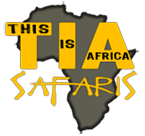Best of Kenya and Tanzania Safari
14 Nights, 15 Days • Up to 12 Passengers • 4 – 5 Stars
Nairobi – Samburu National Reserve – Ol Pejeta Conservancy – Lake Nakuru National Park – Masai Mara – Arusha – Tarangire National Park – Seronera – Karatu
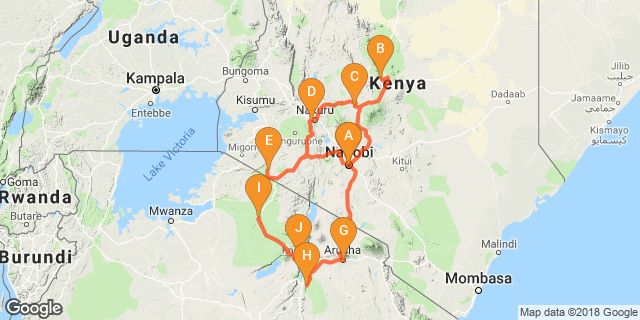
TRIP CODE: SMBRU2019
SKIP TO:
ACCOMMODATIONS
| Accommodation | Destination | Basis | Room Type | Duration |
| Hilton Nairobi | Nairobi | B&B | 1x Double | 1 Night |
| Samburu Sopa Lodge | Samburu National Reserve | FB | 1x Double | 1 Night |
| Sweetwaters Serena Camp | Ol Pejeta Conservancy | FB | 1x Double | 1 Night |
| Ziwa Bush Lodge | Lake Nakuru National Park | FB | 1x Double | 1 Night |
| Mara Eden Safari Camp | Masai Mara | FB | 1x Double | 3 Nights |
| Hilton Nairobi | Nairobi | B&B | 1x Double | 1 Night |
| The African Tulip | Arusha | B&B | 1x Double | 1 Night |
| Tarangire Simba Lodge | Tarangire National Park | FB | 1x Double | 1 Night |
| Kisura Serengeti Camp | Seronera | FB | 1x Double | 3 Nights |
| Country Lodge Karatu | Karatu | FB | 1x Double | 1 Night |
Key
B&B: Bed and Breakfast
FB: Dinner, Bed, Breakfast and Lunch
ITINERARY
Day 1: Nairobi – Hilton Nairobi or similar (OS)
Nairobi
Nairobi is Africa’s 4th largest city and is a vibrant and exciting place and although it has developed a reputation which keeps tourist visits brief there are some fascinating attractions: its café culture, unbridled nightlife, the National Museum, the Karen Blixen Museum and most notably just 20 minutes from the city centre wild lions and buffalo roam in the world’s only urban game reserve.
Overnight: Hilton Nairobi
Located in the heart of the shopping and business district of Nairobi, Hilton Nairobi offers easy access to many local attractions including the Kenyatta International Conference Centre, curio shops and Masai craft market on weekends. The comfortable rooms all have soundproofed windows and internet access. Upgraded rooms offer more space, city views, and private terraces on the pool level as well as access to the exclusive Executive Lounge, complimentary breakfast and refreshments throughout the day. Other facilities at this hotel include five dining and beverage venues, a heated outdoor pool, and a fully-equipped fitness center.
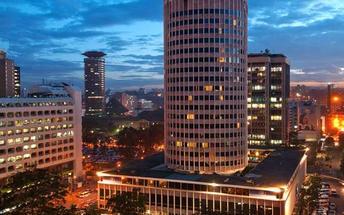
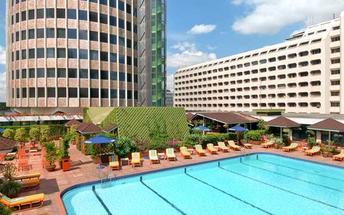
Basis
Bed & Breakfast
Day 2: Samburu Sopa Lodge (OS), Samburu National Reserve
Samburu National Reserve
Samburu is remote, hot and arid with rugged hills and undulating plains. And like most wildlife areas in such environments Samburu’s life blood is the Ewaso Ngiro River, and its riverine forests, which forms its boundary with the Buffalo Springs National Park. This is one of the few areas in Kenya where you can spot southern and northern dwelling species together with highlights being reticulated giraffe, the long necked gerenuk, Somali ostrich and Grevy’s Zebra. Samburu was one of the homes of Elsa the Lioness, star of the bestselling book and award winning movie Born Free.
Overnight: Samburu Sopa Lodge
The lodge is built atop raised ground allowing panoramic views of distant Samburu hills to one side and El Ndonyo Keri (Samburu name for Mt. Kenya) on the other.
Samburu Sopa Lodge is situated 325 kms from Nairobi, in the middle of the park, next to the new Oryx airstrip.
It is accessible from the main Isiolo – Moyale road at both Ngare Mara as well as Archers post junctions.
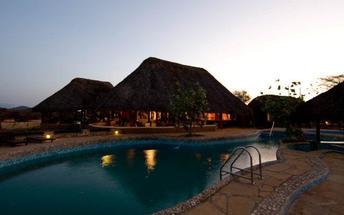
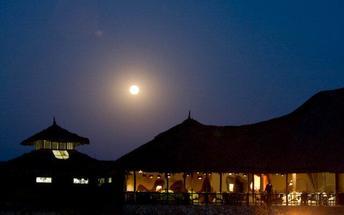
Basis
Full Board
Day 3: Sweetwaters Serena Camp, (OS) Ol Pejeta Conservancy
Ol Pejeta Conservancy
Resting at the foothills of Mount Kenya and the Aberdare Mountain Range, in central Kenya’s Laikipia County, the Ol Pejeta Conservancy is the largest black rhino sanctuary in East Africa. It is also home to the last three remaining northern white rhino in the world. Originally a working cattle ranch in colonial Kenya and now a pioneering wildlife conservancy, Ol Pejeta works to protect wildlife and provide a sanctuary for rescued chimpanzees. The Conservancy is a popular safari destination and is home to the renowned ‘Big Five’ as well as a wide selection of other African animals including: zebra, giraffe, hippo, cheetah, jackal, serval, hyena, vervet monkey and many more. Visitors can enjoy an assortment of outdoor activities such as horse rides, game walks, and nocturnal game drives.
Overnight: Sweetwaters Serena Camp
A sheltered oasis, clustered around a water hole and set in the pristine calm of the private Ol Pejeta Conservancy, Sweetwaters Tented Camp offers a charming blend of under-canvas ambiance and safari luxury. Located on the plains of Mount Kenya, the camp features thirty-nine luxury tents, each with its own private veranda overlooking the water hole. The central Rhino Restaurant is housed in the former manager’s house of this once colonial farm, and offers both regional and international cuisine. Also within the house is the Kashoggi Bar and lounge, which centres on a blazing log fire. The Waterhole Bar, built in the style of a game-viewing hide, overlooks the waterhole and offers unrivalled wildlife-watching.

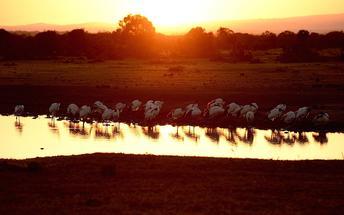
Basis
Full Board
Day 4: Ziwa Bush Lodge, (OS) Lake Nakuru National Park
Lake Nakuru National Park
Lake Nakuru National Park was created to protect the Lake and its flocks of Lesser Flamingo which are drawn to the algae that flourishes in the saline waters of the soda lake. The national park is home to hippos, black and white rhino, Rothschild giraffe, buffalo and eland.
Overnight: Ziwa Bush Lodge
Ziwa Bush Lodge is located within majestic surroundings, just fifteen minutes from Lake Nakuru and offers a luxuriously unique boutique experience to its guests. The property boasts traditional Makuti thatched-roof buildings in various configurations that feature ensuite bathrooms and mountain views.
Facilities at Ziwa Bush Lodge include an outdoor swimming pool, BBQ facilities, a terrace and a garden.
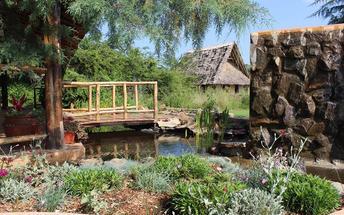
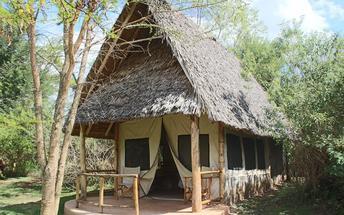
Basis
Full Board
Day 5, Day 6 & Day 7: Mara Eden Safari Camp, (OS) Maasai Mara
Masai Mara
The Masai Mara together with Tanzania’s Serengeti form Africa’s most famous wildlife park. The image of acacia trees on an endless grass plain epitomises Africa for many, and then add a Maasai warrior and some cattle to the picture and the conversation need go no further. The annual wildebeest migration through the Serengeti and the Masai Mara is the largest mass movement of land mammals on the planet – with more than a million animals following the rains. But that is not where the game viewing ends; large prides of lions, elephants and giraffes in grasslands, gazelles and eland to mention but a few. Aside from traditional vehicle safaris, hot-air ballooning over the Mara plains has become almost essential and you can even do a horseback safari.
Overnight: Mara Eden Safari Camp
Mara Eden Safari Camp Hidden deep in the Maasai Mara game reserve, along the great Mara river, lies a magical, untouched and untamed valley with crocodiles basking on the banks of the river and hippos fighting for dominance against a backdrop of absolute wilderness, for centuries the great wildebeest migration has thundered through this hidden valley and crossed the Mara river. Nestled in the midst of this valley is our little boutique tented camp, sit out on the varendah and watch the magic of the african wilderness unfold before you. We invite you to be a part of this untamed bit of Africa!
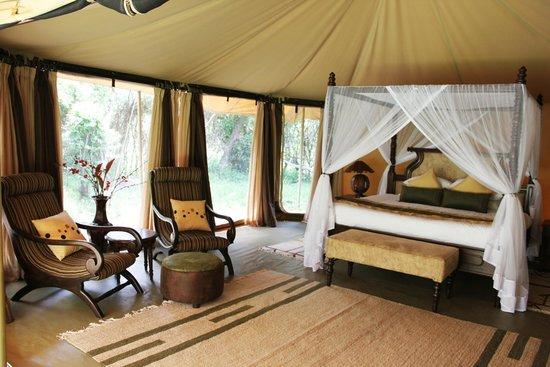
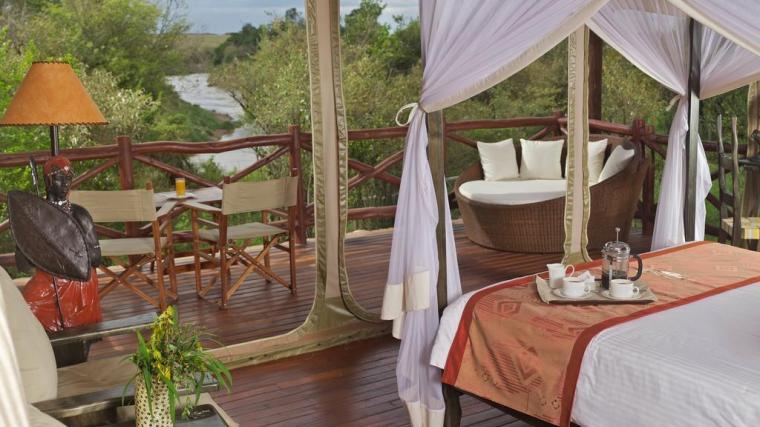
Basis
Full Board
Day 8: Hilton Nairobi, (OS) Nairobi
Overnight: Hilton Nairobi
Located in the heart of the shopping and business district of Nairobi, Hilton Nairobi offers easy access to many local attractions including the Kenyatta International Conference Centre, curio shops and Masai craft market on weekends. The comfortable rooms all have soundproofed windows and internet access. Upgraded rooms offer more space, city views, and private terraces on the pool level as well as access to the exclusive Executive Lounge, complimentary breakfast and refreshments throughout the day. Other facilities at this hotel include five dining and beverage venues, a heated outdoor pool, and a fully-equipped fitness center.


Basis
Bed & Breakfast
Day 9: The African Tulip, (OS) Arusha
Arusha
Arusha is the safari capital of Tanzania located at the foot of Mt. Meru, close to Mount Kilimanjaro, the Manyara, Tarangire and Ngorongoro National Parks. From there it’s only a short trip to the Serengeti. Just to the north, on the slopes of Mt. Meru is the Arusha National Park. Built by the Germans as a centre of colonial administration because of the temperate climate, Arusha is a good spot to take a day or two off from your safari.
Overnight: The African Tulip
The African Tulip is an elegant and charming Luxury Boutique Hotel in the heart of Arusha. A warm and friendly welcome awaits guests who want to experience the best of Tanzanian hospitality. The hotel has been designed with safari travellers, business persons, families, honeymooners, elite and leisure travellers in mind. It has amenities of convenience whilst offering a high standard of luxury.
The hotel has 29 guest rooms, 7 of which are suites. The rooms are individually and stylishly decorated using warm African tones. A lot of African material and local art has been used reflecting the common thread that runs throughout the hotel which is one of consistence and quality.
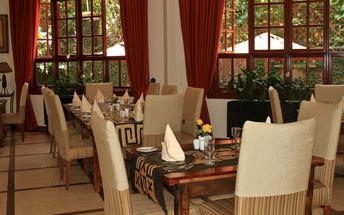
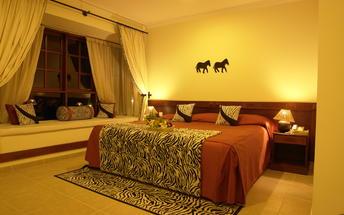
Basis
Bed & Breakfast
Day 10: Tarangire Simba Lodge, (OS) Tarangire National Park
Tarangire National Park
After the Serengeti, Tarangire has the greatest concentration of wildlife in Tanzania and in the dry season the Tarangire River is a magnet for thirsty wildlife. Large herds of elephants and migratory wildebeest, zebra, buffalo, impala, gazelle, hartebeest and eland gather and not surprisingly the predators follow. This is also the one place in Tanzania where dry-country antelope such as oryx and gerenuk are regularly spotted. Tarangire is also known for its spectacular baobab trees, and its breathtaking views of the Masaai Steppe and the mountains to the south. Located just a few hours drive from the town of Arusha, Tarangire is a popular stop for safaris travelling through the northern circuit on their way to Ngorongoro and the Serengeti. The park extends into two game controlled areas and the wildlife are allowed to move freely throughout.
Overnight: Tarangire Simba Lodge
Tarangire Simba Lodge opened in July 2015 with eight classic tents under thatch, and eight more anticipated being ready by early 2016. Resident wildlife includes lion, zebra, bushbuck, impala, porcupine, monkeys, warthog, mongoose and more. Elephant, buffalo, ostrich and giraffe frequently pass through while the bird life is prolific and vibrant.
Located near the fully functional Sangaiwe Gate to Tarangire National Park, the lodge grounds border the park and a Wildlife Management Area.
Accommodation is in spacious classic canvas safari tents constructed on platforms with wooden floors. Tents are en-suite with attached dressing room, toilet and shower. Additionally there is an outdoor shower and each tent has a private veranda with views to the bush. The entire structure is under a permanent roof topped with thatch. Furnishings are handcrafted from African hardwood complimented with tastefully selected fabrics. Both twin and queen tents are available; electricity and hot water are solar powered. Full amenities are provided.
Facilities include a dedicated reception area and separate lounge and dining room—all constructed out of canvas on raised platforms—created with relaxation and enjoyment in mind. Common areas are connected with wooden walkways and there is a deck for outdoor dining adjacent to the dining tent. Wi-Fi is available in the common areas. In addition to a large swimming pool there is a ‘tree-top’ viewing platform built in a stately acacia tree to facilitate wildlife watching and star gazing.
Service is our main focus. On arrival guests receive a warm welcome from the lodge staff, a refreshing drink and a towel to rinse away the journey’s dust. Afternoon tea is on hand from 3:30 pm and there is a fully stocked bar with wine list featuring South African wines.
Food: As at all our lodges, continental food is served, using the finest local ingredients available with an emphasis on healthy food including lots of fresh fruits and vegetables. Fresh bread is baked daily. At breakfast coffee, tea, hot chocolate and herbal teas, cereals, a selection of fruits and muffins or pancakes are on the buffet. Oatmeal, toast, eggs, bacon and sausage are cooked to order. We provide butter, honey, jam, marmalade and peanut butter on the table. We’ve tried hard to develop a lunch box that’s different from the rest.
Lunch at the lodge is a selection of quiche, pizza and salads, spaghetti or curry and rice. Dinner is a four course buffet― soup (always vegetarian) with bread or rolls, salad, two main courses plus rice and/or potatoes and fresh steamed vegetables. Our main courses alternate between fish, beef, pork, lamb and chicken dishes. We can cater to special diets such as gluten free, vegetarians and vegans with prior notice and substitute non-animal protein dishes at every meal such as lentils, nut roast, beans or cheese. We avoid fatty, oily and fried foods. At tea-time (3:30 – 6:00 pm) there is tea (normal and herbal) coffee, hot chocolate and cake or cookies.
Laundry is available at reasonable rates for guests staying two or more nights.
Guides and drivers are accommodated near our near our staff quarters. Each room has two beds, fresh sheets, clean towels and warm blankets with toilet paper and soap provided. Guides can eat with the guests or can eat at a designated driver’s table. There is no charge for guide accommodation or meals but drinks are to their own account at resident rates. Tour leaders stay in guest accommodation with prior arrangement. In the event of both a guide and translator accompanying a group we need to be advised ahead of time; there is a charge for a second bed and meals.
Tipping Policy: For guests who wish to tip our staff there is a tip box. We ask that no individuals be tipped (except perhaps in cases of exceptional service of a personal nature). All staff members share equally in the tips.
• 8 classic luxury tents
• Outdoor showers
• Ample wildlife
• Views to Lake Burunge
• Beautiful, tranquil site bordering Tarangire NP
• Near the new Sangaiwe Gate
• Large swimming pool
• Reception, dining, lounge
• Tree house for views and sundowners
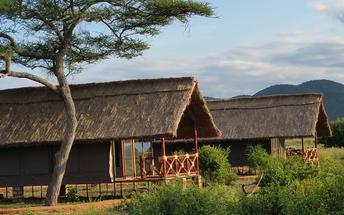
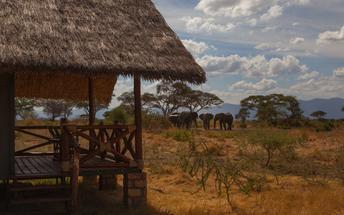
Basis
Full Board
Day 11, Day 12 & Day 13: Kisura Serengeti Camp, (OS) Seronera
Seronera
The Seronera region, in the central Serengeti, is set directly on the Great Migration route, and offers excellent viewing of this incredible annual phenomenon, when countless wildebeest flood across the plains. While migratory game populations fluctuate seasonally, Seronera is still a wildlife hotspot at other times of the year, sheltering the Big Five, among many other species. A number of small campsites provide accommodation and visitors can enjoy hot air balloon trips and walking safaris as well as guided game drives.
Overnight: Kisura Serengeti Camp
Kisura Serengeti Luxury Mobile Camp is located in the heart of Serengeti National Park, just 2 kilometres from Seronera Airstrip and offers the true safari experience to its guests. Shaded by the Tortilla’s Acacia trees, the luxury tented camp, is a home away from home, overlooking the spectacular African Savannah. Kisura Camp has got eight comfortable luxury tents each with queen size beds, private shower room, toilet room, dressing area and a large veranda. Fresh gourmet menus are served to satisfy every pallet. The gourmet chef takes fine dining to the next level. The camp operates throughout the year and can be reached by air or by road.
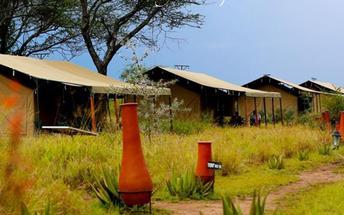
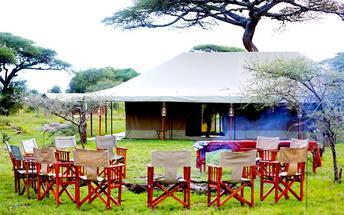
Basis
Full Board
Day 14: Country Lodge Karatu, (OS) Karatu
Karatu
Travellers heading for the Serengeti and Ngorongoro Crater will inevitably pass through the town of Karatu in the green hills of Tanzania’s northern highlands. Presided over by the towering Ol Deani Volcano, this small, colourful town serves as a popular overnight stop for visitors exploring the area’s many game parks. The town offers a variety of activities including browsing the bustling marketplace, sampling beer at a local brewery, visiting a traditional Iraqw homestead, or taking a guided walk through the Ngorongoro Forest in search of waterfalls and elephants caves. Whether you are looking for cultural tours, hiking and biking opportunities, a chance to enjoy an authentic rural Tanzania experience, or simply a break between safari game drives, this underrated town has plenty to offer.
Overnight: Country Lodge Karatu
Located on the outskirts of Karatu, a quaint country town on the Great Escarpment, midway between Lake Manyara and the Ngorongoro Conservation Area, Country Lodge is situated in the centre of Northern Tanzania’s green belt district and farming community. Country Lodge Karatu symbolizes simple country comforts, providing pleasant and affordable lodging in the heart of Tanzania’s rich and scenic highlands. We are the ideal ‘Stepping Stone’ for safaris into Ngorongoro Crater and beyond, as well as other travellers visiting the area. Our lodge sits within five acres nestled on the edge of Karatu town, surrounded by rolling plains reaching up to the coffee hills of Oldeani and the forests’ of Ngorongoro. Garden paths led to eleven double cottages surrounded by green lawns, hedged by brightly flowered bougainvillaea, tropical plants and trees. Birds and butterflies feel right at home in the garden, as you will in our lodgings. Come and enjoy the tranquillity, home comforts and warm Tanzanian hospitality that Country Lodge offers.
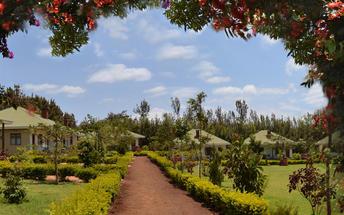
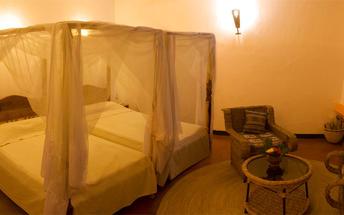
Basis
Full Board
Day 15: End of Itinerary
Today we head back to Arusha and visit the locally famous Cultural Art Center which houses the largest collection of African Art in Africa. You may also want to purchase souvenirs at the myriad of shops at the Center. In the afternoon you will be transferred to your evening international flight.
TRAVEL INFORMATION

Resting in the magnificent Great Rift Valley and presided over by the majestic Mount Kilimanjaro, Kenya is characterised by hauntingly beautiful natural landscapes of forested hills, patchwork farms, wooded savanna and vast forests brimming with an extraordinary abundance of wildlife. The nation’s diverse range of traditional African cultures is influenced by over 70 unique ethnic groups from the Maasai, Samburu, Kikuyu, and Turkana tribes to the Arabs and Indians that settled on the coast. Add to this: an exquisite tropical coastline fringed with breathtaking golden sand beaches; gorgeous coral gardens providing excellent snorkeling and diving opportunities; and a slew of lively beach resorts, and it is easy to see why so many visitors flock here from around the world to experience a truly unique African adventure in one of the world’s most pristine safari destinations.
Currency
The currency in Kenya is the Kenyan Shilling (KES; symbol KSh). 1 Kenyan Shilling = 100 cents. Notes are in denominations of KSh1,000, 500, 200, 100 and 50. Coins are in denominations of KSh20, 10 and 5.
Foreign currency can be exchanged at the major banks, bureaux de change or authorised hotels. The banks at Jomo Kenyatta International Airport and Moi International Airport have 24-hour exchange services. The easiest currencies to exchange are US Dollars, Pounds Sterling and Euros.
There are no restrictions on the import or export of local or foreign currency. However, amounts exceeding US$5,000 or equivalent must be declared.
Banking
Banking hours: Monday-Friday 09h00-16h00, Saturday 09h00-12h00. Banks in Mombasa and the coastal areas typically open and close half an hour earlier.
Credits Cards are widely accepted in all major hotels and more upmarket establishments, with the most recognized being Master Card and Visa. American Express and Diners Club cards are occasionally accepted. However, you will need some cash handy because smaller shops will only accept cash.
Almost every bank now has an ATM, and they are increasingly being installed at petrol stations in cities and large towns.
Travellers cheques are no longer accepted in Kenya.
Travel, Transport and Getting Around
Nairobi has two airports for domestic and regional flights: Jomo Kenyatta International Airport and Wilson Airport (www.kaa.go.ke). Kenya has over 150 domestic airports and airstrips and there are daily flights to the most popular destinations. In addition to the scheduled airlines, several private charter companies operate out of Wilson Airport.
Kenya Airways (www.kenya-airways.com), Air Kenya (www.airkenya.com), Fly 540 (www.fly540.com), Mombasa Air Safari (www.mombasaairsafari.com) and Safarilink (www.flysafarilink.com) serve the most popular safari destinations, plus many others such as Lake Victoria.
On smaller, domestic planes the baggage allowance is restricted to 10-15 kg (22-33 lbs). Arrangements can be made to leave excess luggage with hotels or airlines.
Main roads between the major cities and towns are generally in good condition, and easily navigable in a normal saloon car. Most highways in the south are paved, but that’s not the case in the north.Vehicles are driven on the left side of the road.
While major roads are generally in a good condition, most minor gravel roads have deep potholes which deteriorate further in the rainy season. Dirt roads, including those in the parks and reserves, are extremely rough, and some are only passable with a 4-wheel drive.
You can hire self-drive and chauffeur-driven cars from travel agents and international hire companies. Drivers must be at least 23 years of age. Budget (www.budget.com) and Europcar (www.europcar.com) have outlets at Jomo Kenyatta International Airport in Nairobi. Budget also has a desk at Moi International Airport in Mombasa, while Europcar has an office in town. Car hire can be expensive and rates vary significantly.
A driving licence from a home country (and a translation if this is not in English) or an International Driving Permit is required. Third-party insurance is mandatory when hiring a car and it’s recommended to take out the additional collision damage waiver. A valid credit card is also needed.
Matatus (shared minibus taxis) hop from town to town, starting and finishing at bus stations. Fares are paid to the conductor. Private taxis can also be hired for long-distance journeys.
It is not possible to rent motorbikes or mopeds but some of the beach resorts hire out bicycles.
Numerous private bus companies operate in Kenya. Most vehicles are old and tend to depart when full, which means there are no set timetables. Petty theft on the vehicles and at bus stations can be a problem. Nevertheless, buses are cheap and link all long-distance destinations. Plus, seatbelts are now mandatory, so buses are relatively safe.
Nairobi and Mombasa have efficient local bus systems and there are also frequent matatus, but reckless driving and petty theft makes them a dodgy option for tourists. Three-wheeled auto rickshaws are popular in town centres and carry up to three passengers.
The newer fleets of taxis (usually painted white with a yellow band) are reliable and have meters. The older yellow taxis do not have meters, so fares should be agreed in advance. In Nairobi, there is a fleet of London-style black cabs. A 10% tip is expected. Cabs cannot be hailed in the street, but can be found parked in taxi ranks.
Food, Drink and Cuisine Advice
Bottled water is advisable for the first few weeks of your stay. When buying bottled water, check the seal of the bottle is intact. Never drink tap water unless it has been boiled, filtered or chemically disinfected (such as with iodine tablets). Never drink from streams, rivers and lakes. It’s also best to avoid drinking from pumps and wells – some do bring pure water to the surface, but the presence of animals can still contaminate supplies. Avoid ice and washed salads and fruit except in upmarket hotels and restaurants. Milk is pasteurised and dairy products are safe for consumption. Food prepared by unlicensed vendors should be avoided at all times.
Nairobi has some of the finest eating establishments in Africa. Many different cuisines and types of restaurants are available, from fast food to fancy. Many five-star hotels have excellent restaurants. Restaurants are called “hotels” and there are many in Nairobi. The local cuisine is also worth trying out, particullarly Pilau-a chicken and rice dish, cabbage and rice; and the staple food in Kenya-Ugali, made from maze flour.
Many restaurants can be found downtown and in the areas of Westlands and Hurlingham but these areas are filled with tourists and places like Ayani, Olympic, Kibera, and other places have more authentic food. Among the many cuisines available are Indian, Brazilian, Chinese, Thai, Japanese, German and French restaurants. Fast food restaurants, mostly by South African chains (Steers, Nandos), are common in the larger urban areas.
Climate and Weather
Kenya lies on the equator and has a pleasant tropical climate, but there are large regional climatic variations influenced by several factors, including altitude. Temperatures drop by about 6°C for every 1000m you climb (or 3.5°F per 1000ft). Kenya’s daytime temperatures average between 20°C/68°F and 28°C/82°F, but it is warmer on the coast. The coast is hot and humid all year round, but the heat is pleasant and tempered by the monsoon winds. Kenya is too close to the equator to experience a real winter and summer. There is, however, both a dry and wet season. The wet season is from November to May and the Dry season is from June to December.
Clothing and Dress Recommendations
Comfortable, casual clothing that is lightweight is the best bet while on safari. It can be quite cool in the early mornings, so you’ll want to dress warmly in layers, until the sun has a chance to warm up the air. “Kenya Convertibles”, khaki pants with zip-off legs, are perfect for cool early morning game drives that turn warm before you’re back in camp. Walking shorts, long pants, cotton shirts and tees are just right. A cotton bush jacket or wind-breaker will be useful along with a warm sweater or fleece jacket for the cool nights. And, a hat that ties on is a must. There is not a good deal of long walking or hiking on most safaris, so a comfortable pair of walking shoes or tennis shoes and a pair of sandals should be adequate. You will need thorn-proof soles.
In Kenya’s major cities the dress code is conservative but not overly formal – jeans and decent tops for women are fine. Swimsuits are acceptable on the beach but you’ll need to cover up in public places.
Electricity and Plug Standards
Electric Power is 220V – 240V running at 50Hz. The Plug type used in Kenya is the 3 large flat prong (UK). If your appliances are compatible with 220V-240V electrical output, an adapter is all that you will need, if not a voltage converter will be necessary.

The name Tanzania conjures up images of wildebeest stampeding across vast savannah, rain forests teeming with monkeys and birdlife, and great plains brimming with legions of game. All of these natural wonders and more are on offer in this exceptionally diverse African nation. Visitors typically visit Tanzania to partake in at least one of the four well known Tanzanian tourist experiences: a relaxing seaside vacation on the picturesque island paradise of Zanzibar, an underwater tour of some of the world’s most renowned dive sites around the gorgeous Spice Islands, a safari adventure in some of Africa’s most impressive game reserves, or a hiking excursion around Mount Kilimanjaro National Park. Whichever of these incredible holidays you choose, you will undoubtedly be welcomed by some fabulously friendly and peaceful inhabitants who, despite being divided into 120 different ethnic groups and cultures, live in harmony with one another and provide some of the most wonderfully exotic local cuisine you could imagine. With all of this diversity on offer, the most difficult part of your Tanzanian holiday experience is likely to be deciding where to go!
Currency
In Tanzania, the unit of currency is the Tanzanian Shilling, which is divided into 100 Cents. Notes are issued in denominations of 500, 1000, 2000, 5000, and 10000 Shillings. Coins are issued in denominations of 50, 100 and 200 Shillings.
Banking
Banks are open from 9:00am to 3:00pm Monday to Friday. Many banks are equipped with 24 hour ATM machines.
Credit cards and travellers checks are not widely accepted in Tanzania. Where they are accepted can high service fees and poor exchange rates be expected. Major foreign currencies – particularly US $ – are accepted in Tanzania and are convertible at banks and bureau de changes in the main towns and tourist areas. If bringing cash in US $, please make sure bank notes are in good condition, with no cuts or damage and are not older than 2004. Most banks offer higher exchange rates for US $ 100 / US $ 50 bank notes compared to US $ 20 / US $ 10 or US $ 5 bank notes.
Travel, Transport and Getting Around
If you are visiting a number of parks and reserves in Tanzania, you can either drive or fly between them. Roads in most of the wilderness areas are in poor condition and unmarked, and self-driving is not recommended. Operators will supply you with a driver who doubles as an informal guide; alternatively, you can arrange to fly to your destination and utilize a car and driver supplied by the lodgings. Elsewhere in Tanzania, towns and cities are linked by a steady stream of buses and dala-dalas (minibuses), and in the cities, there is public transport in the way of buses, dala-dalas, taxis, and, in some places, bicycles or tuk-tuks. Driving is on the left hand side of the road.
Precision Air run regular services, mostly via Dar es Salaam, Kilimanjaro or Zanzibar, to all main towns and other destinations in East Africa and beyond. All national parks and some of the top-end luxury lodges have airstrips and Coastal Air operates between these and the main airports on the mainland and the islands of Zanzibar, Pemba and Mafia. ZanAir has frequent connections between Zanzibar, Pemba and the mainland.
Food, Drink and Cuisine Advice
Most camps, lodges or hotels cater specifically to tourists and serve Western-style food, ranging in standard, but generally are excellent. Game lodges tend to offer a daily set menu with a limited selection, so it is advisable to have your tour operator specify in advance if you are a vegetarian or have other specific dietary requirements. First-time visitors to Africa might take note that most game lodges in and around the national parks have isolated locations, and driving within the parks is neither permitted nor advisable after dark, so that there is no realistic alternative to eating at your lodge.
Tap water in Tanzania is generally not safe to drink, and most travellers try to stick to mineral water. Filtered and bottled water can be difficult to find you are travelling outside of main town and so it is advisable to stock up. Most camps, lodges and hotels have bottled water readily available.
Climate and Weather
Just south of the equator, Tanzania is huge and its sheer size means that the climate varies considerably within it. However, generally the main rainy season, or the ‘long rains’, lasts during about March, April and May. Afternoon tropical downpours are the norm – which are heavier and more predictable beside the coast and on the islands. The humidity is high and daily temperatures reach the low-mid 30°s.
The long dry season lasts throughout June, July, August, September and October is when rainfall is unusual, even on the islands. Temperatures vary hugely with altitude and location, but it’s usually a fine, clear sky and sunny weather – it’s a great time to visit Tanzania. During November and December there’s another rainy season: the ‘short rains’. These are much lighter than the main rains and less reliable.
If it has rained during the short rains, then it normally dries up for a few months, January and February, which is Tanzania’s ‘short dry season’, before starting to rain again in earnest in March.
Clothing and Dress Recommendations
It never gets really cold in Tanzania so lightweight clothing, preferably cotton or linen, is recommended. While on a game viewing safari, avoid brightly coloured clothing, stick to whites, beiges, khakis and browns. There may be long days sitting in safari vehicles, so it is advisable to wear light comfortable clothing such as short sleeved shirts and cotton/linen trousers or shorts. Denim will become too hot and extremely uncomfortable. Walking shoes and socks will be required.
The evenings will be chilly, so long sleeved shirts and trousers should be worn. A sweater may be needed. These will also prevent you being bitten by insects. A hat should be worn at all times outside. The sun may sometimes not feel hot, but it can still easily burn, especially if it is cloudy and overcast.
If visiting Zanzibar or any coastal town don’t forget to take a swimsuit, as it is invariably warm. Ladies are recommended to take cotton skirts, blouses and dresses. Sandals are a must for this environment! On the beaches and within the confines of hotels, normal swimwear is acceptable but nudity is not.
As over a third of the population in Tanzania is Muslim, it is therefore not etiquette for ladies to walk around in public displaying their legs and shoulders. Remember to dress modestly as short shorts, miniskirts, vests and tank tops will be frowned upon.
Electricity and Plug Standards
The electricity supply in Tanzania is 220/240 volts at 50Hz. Plugs are 3 point square (UK Type). Adapters are available at major airports.
